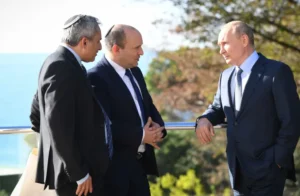Moscow reportedly set to demand that UN Security Council condemn the alleged Israeli strike on Damascus airport.

Russia is attempting to draw attention away from its ongoing war in Ukraine by stirring up a crisis with Israel on the international stage, Israeli analysts believe.
For more stories from The Media Line go to themedialine.org
Moscow is set to put forth a proposal for a UN Security Council resolution condemning Israel for its recent alleged attack on Damascus International Airport, Israeli officials told the KAN News on Sunday. The strike caused serious damage to the airport and put it out of commission for days.
The draft proposal blames the attack on Israel and says that it undermines regional stability and goes against international law, according to Kan. Though the resolution is unlikely to pass, some analysts say that the move could mark a significant deterioration in Russia-Israel ties.
“There is no turning back from that,” Zvi Magen, a research fellow at the Institute for National Security Studies at Tel Aviv University, who was Israel’s ambassador to Ukraine from 1993 to 1997 and ambassador to Russia from 1998 to 1999, told The Media Line.
In addition to turning to the UNSC, the Kremlin also publicly criticized Israel last week over the strike and summoned Israel’s ambassador to Russia, Alexander Ben Zvi, for further clarifications.
“Since the start of the war [in Ukraine] there have been more and more incidents where Russia complains about Israel and takes ‘unfriendly’ steps,” Magen said. “I think the main reason is to ignite a crisis here in the Middle East by pushing Israel to respond or by kindling a commotion on the international stage. The goal is to bring the world’s attention away from Ukraine.”
Magen was referring to a series of recent public incidents in which the Kremlin has publicly criticized Israel.
Last week, Russia said that it was “deeply concerned” about an Israeli court ruling that sided with Ateret Cohanim – a group that promotes Jewish residency in east Jerusalem – over its purchase of a Jerusalem property from the Greek Orthodox Church. The organization bought three buildings from the church in a secret controversial purchase in 2004, but the church claimed the properties were acquired illegally and without its permission.
In a separate event in April, Russian President Vladimir Putin sent a personal letter to Israeli Prime Minister Naftali Bennett demanding that Israel hand over control of another church in Jerusalem, specifically the contested Alexander Nevsky Russian Church property in the Old City.
“At the minimum, Moscow wants to show the Syrians and the Iranians that it is taking care of them and is on their side,” Magen asserted. “It’s possible that they have some kind of problem with the Syrians and Iranians regarding maintaining their [military] presence in Syria.”
The increasingly aggressive rhetoric is not related to Israel’s stance in the Ukraine war, which has been fairly favorable toward Moscow, Magen asserted. Jerusalem has refused to endorse sanctions against Russia or supply weapons to the Ukrainians.
Professor Efraim Inbar, president of the Jerusalem Institute for Strategy and Security (JISS), believes the Kremlin is using the international forum of the United Nations to express its displeasure with the air strike on the Damascus airport.
“It seems that this was not coordinated with the Russians or at least they’re having second thoughts about it,” Inbar told The Media Line. “It’s probably a way for [them] to express their rage but if they want to change their policies, they have enough channels with us for doing so.”
Unlike Magen, Inbar does not view the possibility of a UNSC resolution as being serious and called the world body a “morally bankrupt institution.” Given Russia’s increasing isolation in the international arena, he noted, any resolution it puts forth at the United Nations is unlikely to pass muster.
Nevertheless, Inbar conceded that the move may signal that a change is forthcoming regarding Israel’s freedom to carry out air strikes within Syria. Israel has launched air strikes in Syria against what it says are Iranian targets, which move advanced weaponry to Hizbullah in Lebanon and within Syria itself.
Russia “may also want to divert attention from what’s happening in Ukraine,” Inbar said. “I don’t think they want a diplomatic crisis with Israel at this stage.”
Similarly, Magen does not believe that Moscow and Jerusalem are on the verge of a diplomatic crisis.
“Russia is in no position at the moment to fight directly with Israel; it doesn’t have the military or political capacity to do so,” Magen said. “Therefore, they’re trying to create a commotion and then they will backpedal as they have done previously.”
